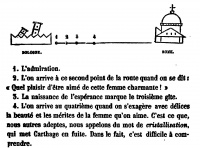Falling in love
From The Art and Popular Culture Encyclopedia
|
"Eros is the oldest of gods, says Plato. He is the god of love, lust, blind passion and sexual reproduction. If an arrow from Eros's bow strikes a target, the victim falls immediately in love. Eros's parentage is significant: he is the son of Aphrodite, goddess of love, and Ares, god of war. He is thus born out of beauty and belligerence, out of love and hate. Out of two opposites that are united nowhere else than in the most intimate space of the human psyche: the sexual act, and its abstraction: eroticism."--A History of Erotica (2011) by Jan-Willem Geerinck |
|
Related e |
|
Featured: |
"Falling in love" is a mainly Western term used to describe the process of moving from a feeling of neutrality towards someone to one of love. The usage of the term "fall" implies many things: that the process may have been in some way inevitable or uncontrollable, risky or putting the lover in a state of vulnerability, that the process is irreversible, or all of these things, in the same way the word "fall" is used in the phrase "to fall ill" or "to fall into a trap". The term is generally used to describe an (eventual) love that is strong, although not necessarily permanent.
See also
- Limerence
- Infatuation
- Love sickness
- I Fall in Love Too Easily
- Attachment theory
- Dating
- Flirting
- Love at first sight
- Love sickness
- Puppy love
- Romantic orientation
- Transference
References
- Denis de Rougemont, Love in the Western World Pantheon Books, 1956.
- Francesco Alberoni, Falling in Love, New York, Random House, 1983
- Essays in Love, 1993, Alain de Botton



